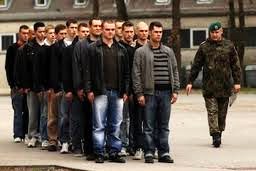
The thought experiment known as the Conscript’s Dilemma is at the very core of anarcho-homicidalism. It poses a very basic and very primal question that invites the listener to question their inherent attitudes to hierarchy, violence and submission. This essay discusses it from an anarcho-homicidalist perspective.
Imagine that you are a young man entering the prime of his life. Your village lies in the territory of a despotic king who regularly raises conscript troops to go and fight for treasure in overseas adventures. Those sort of adventures are foreign to you. You have you own life to live in the village – obligations to discharge, maidens to court etc. Life is orderly and good.
One day a conscription officer rides into your village. He explains that it’s war time again, and that he has come to round up for the army all fighting age men – which means you. The penalty for refusing to heed the king’s call is death.
This scenario has played out millions of times throughout the history of the Earth. It’s well-known what happens in the vast majority of cases: the villagers, cowed by fear of the distant king, willingly give up their sons to the war machine for fear of incurring the king’s wrath.
After all, if incurring the king’s wrath means certain death, and going to war only means the possibility of death, and there is no third option, going to war is the obvious correct choice.
Or so it might seem.
An anarcho-homicidalist thinks otherwise. Central to the idea of anarcho-homicidalism is that dominance hierarchies could not form without the consent of the dominated, and that anyone trying to enslave you can rightfully be killed if necessary to protect one’s own liberty. This means that the conscript at the centre of this dilemma has a third option: kill the conscription officer and trust that his fellows are also anarcho-homicidalists.
If the others are also anarcho-homicidalists, they will back him up. They will understand that killing the conscription officer was necessary to protect the village and its residents from the kingdom’s hierarchy. They will understand that the king’s actions are tantamount to an attempt to enslave, because they are implicitly claiming that the bodies of the villagers are the property of the king.
If they are not anarcho-homicidalists, that is to say they are normal men, that is to say they are cowards, they will be terrified of getting into trouble from killing one of the king’s men. They will turn the anarcho-homicidalist in, probably for the inevitable reward, or perhaps even kill him themselves out of a belief that he is a murderer and that the conscription attempt was legitimate.
The anarcho-homicidalist knows that if he killed the conscription officer, the punishment is unlikely to be much more severe than the worst potential cost of obeying the demand for conscription, which is to go to war and get slaughtered.
However the potential reward, should he find enough support in his actions that he is not simply taken down by the king’s local sheriffs, is total freedom.
Ultimately, this is what the question of anarcho-homicidalism often boils down to. If you’re not willing to kill to maintain your freedom, then you can’t maintain it in the face of someone willing to kill to take it away.
The Conscript’s Dilemma could be described in much the same way as the Prisoner’s Dilemma, with which it shares much of the same meathook logic. Essentially it’s a question of game theory, and it’s a curious one because the people involved, despite being best served by co-operation, are challenged by powerful incentives that incline them towards not co-operating.
More precisely, the dilemma is that if everyone was an anarcho-homicidalist, and everyone had confidence in everyone else’s faith in anarcho-homicidalism, they would all choose to kill any conscription officer who tried to force them into the army and thereby make slavery impossible, but if sufficiently few of them are anarcho-homicidalists then they will not resist enslavement efforts out of fear that the slavers will punish them, and so slavery becomes possible.
It is a useful rebuttal to those who reject anarcho-homicidalism right off the bat on account of that it explicitly calls for killing people. Very often, the alternative to having a will to kill in self-defence is to become a slave.
